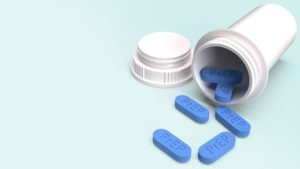A Guide to Truvada and Its Effects on Kidney and Bone Function

It’s no secret that HIV is one of the scariest and most serious ailments that one can be diagnosed with. In recent decades, however, the treatment and prevention options for HIV have improved exponentially. Many patients can see a vast increase in quality of life or avoid contracting the virus altogether by adhering to prescribed regimens.
One of the most common drugs that is included in these regimens is Truvada. For nearly 20 years, it has been an extremely popular and lucrative drug, but recent discoveries have shown it to be much more dangerous than previously thought.
Many patients are now left with serious side effects to their kidneys and bones, and lawsuits are piling up.
What is Truvada?
Truvada is a prescription medication that is taken by those who have already contracted HIV, as well as individuals who haven’t contracted it but are deemed high-risk. Manufactured by Gilead Sciences, the drug was first approved by the FDA as a treatment for HIV in 2004– it was approved again in 2012 as a form of pre-exposure prophylaxis (PrEP, or HIV prevention).
For a free legal consultation, call (725) 900-9000
The drug’s active ingredient, tenofovir disoproxil fumarate (TFD), works by inhibiting an enzyme known as HIV reverse transcriptase. By doing so, the virus is prevented from multiplying, and it is said to reduce the amount of the virus in patients who have already been diagnosed.
Gilead first introduced TFD in its anti-HIV medications back in 2001. The manufacturer has certainly capitalized on their TFD-based drugs over the years, including Truvada– the company’s annual report showed $14.6 billion in revenue from HIV medications in 2018 alone.
The common side effects of Truvada can include:
- Headache
- Nausea
- Diarrhea
- Weight loss
- Fatigue
Click to contact our personal injury lawyers today
However, there are two major symptoms that were unbeknownst to patients: severe kidney damage and bone loss. Longtime users, many of whom are under 50 years old, have since been diagnosed with chronic complications. Furthermore, it appears that Gilead acted to deliberately withhold a safer alternative in order to continue maximizing Truvada’s profits.
Why are Truvada and other TDF Medications Toxic to the Kidneys and Bones?
Complete a Free Case Evaluation form now
Doctors aren’t exactly sure why TDF is harmful to kidney function, but a 2013 study reported that cases of kidney toxicity related to TDF intake have been occurring since Gilead introduced it in 2001, and that it is “now established that TDF presents a tubular toxicity risk.”
Longtime Truvada users have been diagnosed with Fanconi Syndrome, Acute Renal Failure, and other kidney-related conditions.
As far as bone density, most HIV patients are already at an increased risk of osteopenia and osteoporosis. However, TDF medications have been shown to be especially harmful– a report from 2016 stated that TDF can cause up to three percent greater bone density loss than other medications.
A majority of the patients who are prescribed Truvada are under 50 years old, yet after only a few years of use, they can be diagnosed with osteoporosis that is comparable to people in their 80s and 90s. Some users have already had to undergo hip and joint replacements.
Did Gilead Withhold a Safer Alternative to TDF From Patients?
Even with all of that being said, perhaps the most troubling discovery has been Gilead’s apparent refusal to release a safer alternative to TDF, in order to garner as much profit as possible from Truvada.
As early as 2002, the manufacturer was already conducting research on tenofovir alafenamide, or TAF, which is a TDF alternative that is much less toxic to the kidneys and bones. Gilead filed patents for it quietly, yet it was never released and research was mysteriously halted.
It was only years later, as Truvada’s patent came close to expiring, that Gilead suddenly unveiled TAF as a fresh new formula. In response to criticism for the delay, the company denied any liability, saying that they are under no obligation to release their products at certain times.
Gilead’s negligent and unethical behavior is criminal, and will not be tolerated– victims are encouraged to come forward.
Am I Eligible for a Lawsuit?
If you or a loved one has taken Truvada either as a form of PrEP or for HIV treatment and has since experienced additional complications regarding kidney and bone function, you may be entitled to compensation.
Any potential plaintiff who wishes to present a case should consider compiling the following materials: proof of Truvada use/ prescription (typically at least a year is sufficient); proof of complications regarding kidney or bone function (or both); a viable correlation between the two– this is typically done through testimony and/or a review of past medical history.
For any immediate concerns regarding Truvada, be sure to contact your physician right away. Then call Van Law Firm at (725) 900-9000. Our experienced team of attorneys are well-versed in medical cases, and can help you recover multiple forms of damages, such as:
- Medical reimbursement, including prescription costs
- Lost wages
- Pain and suffering
Your consultation is free and confidential– call now to get started on the right path toward compensation.
No obligation consultations are always free.
Let Us Help You! Call Now: (725) 900-9000